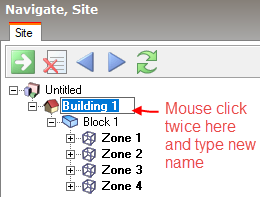
Taking an organised approach to naming your model objects can be well worth the effort when it comes to analysing results and checking models. To help with this DesignBuilder allows you to provide a name for most objects in a model. This section provides advice on how to name objects in your model.
The building name can be edited in the Navigator by clicking on the existing building name to select it and then clicking again to enter edit mode, in the same way that you would rename a file in Windows Explorer. See screenshot below.

The building name is used as a description alongside the filename on Simulation Manager lists.
The block name can be edited in the navigator by clicking on the existing block name to select it and then clicking again to enter edit mode, in the same way that you would rename a file in Windows Explorer. The block name is used as part of IDF zone names and described below under EnergyPlus IDF names.
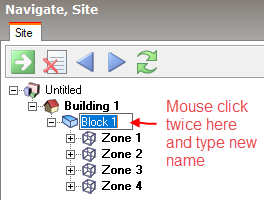
The zone name can be edited in the navigator by clicking on the existing zone name to select it and then clicking again to enter edit mode, in the same way that you would rename a file in Windows Explorer. The zone name is used as part of IDF zone names and described below under EnergyPlus IDF names.
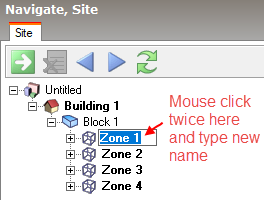
Note: The zone name must be unique within the Block to allow IDF names to be generated without extra characters being added by DesignBuilder to ensure uniqueness.
Tip: If you need to rename a lot of zones you can switch on the Double-click in Navigator to edit model data program option to speed up the process. This can be useful for identifying blocks, zones, surfaces by single-clicking in the Navigator and saves time when renaming many zones at once from block level as it becomes possible to click on the zone Navigator entries to rename them without navigating down to each zone and then having to navigate back up again to block level to rename the next zone.
Surfaces are given names automatically by DesignBuilder and these names cannot be changed by users.
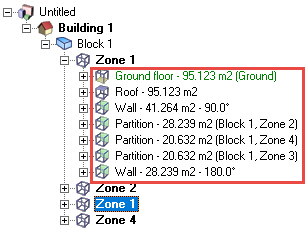
Openings are given names automatically by DesignBuilder and these names cannot be changed by users.
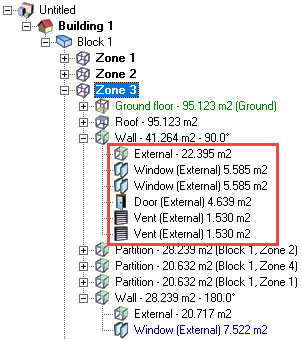
For Detailed HVAC systems, sub-loop components such as boilers, chillers, pumps, heat exchangers etc have editable names. On the other hand, sub-components such as AHU heating coils, water heater heating elements and all zone components and sub-components have hard-set, non-editable names derived from their parent components.
DesignBuilder allows you to use a wider set of characters to name objects than are supported by EnergyPlus. This section explains how user-defined names are converted to EnergyPlus IDF names.
Any characters in user-defined names not supported by EnergyPlus need to be replaced with characters that are allowed before being used as zone IDF object names. So if you work with intermediate EnergyPlus input or output files and need to be able to easily read IDF object names, or if you write your own EMS scripts, or if you use the Results Viewer, you should aim to ensure that the block and zone names you enter are such that the none of the steps below cause characters to be removed or replaced.
In summary, zone IDF names are created by adding the parent block name to the zone name itself, separated by the ":" character. For example, "Zone 5" in "Block 1" would be given an IDF zone name of "BLOCK1:ZONE5". The details of the block and zone name process are as described below.
Note: Steps 1-6 are applied to both zone and block names individually.
HVAC component names remain unaltered except in the case where a duplicate name is found in which case an index is added to the end of the name to produce a unique name.